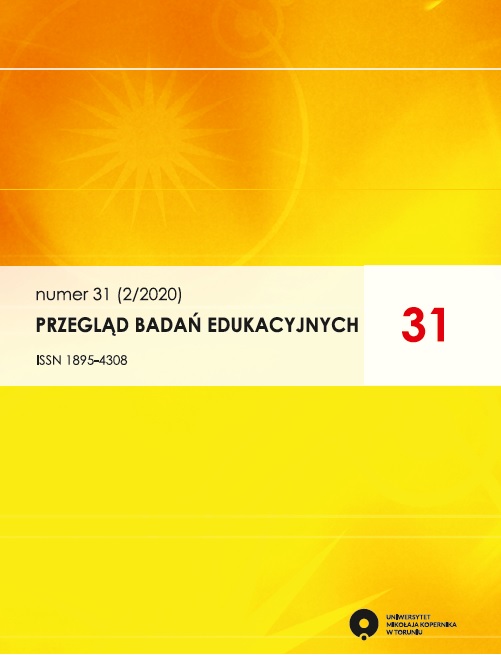ABAS-3 and the PAC-1 in the Study of Adaptive Behaviour of Children and Adolescents with Deeper Intellectual Disabilities
DOI:
https://doi.org/10.12775/PBE.2020.018Keywords
ABAS-3, PAC-1 Inventory, adaptive behaviour, social functioning, severe and moderate intellectual disabilityAbstract
The aim of the analysis was to determine the structure of the adaptive behaviour of people with deeper intellectual disability, as assessed with Adaptive Behaviour Assessment System (ABAS-3). It was also to establish the determinants of the disability with the use of other variables of the psychosocial functioning of these people. The predictors were defined for the so-called General Adaptive Composite (GAC), the ABAS-3 three adaptive domains and ten areas of individual adaptive skills, measured with ABAS-3. The analysis also addressed convergent validity of the tool. It was determined by exploring interrelations between ABAS-3 and PAC-1 Inventory. The r-Pearson test was applied, followed by stepwise multiple regression analysis. The study was conducted on a group of 140 children and young people with moderate and severe intellectual disability. The average age was 13.30 years, with SD=5.06 years. The GAC and ABAS-3 adaptive domains scores positively correlate with the individual areas in PAC-1, with the power of the correlation being greater in the group of assessments carried out by teachers than the analogical assessments carried out by parents. The regression models created for the parents’ group enable a conclusion that the higher the GAC score – including assessment of communication and practical knowledge skills, capability of managing and completing tasks – the higher the growth in socialization, participation in play and domestic activities. On the other hand, in the models created for the group of teachers, the predictor for the GAC score, for the domain of conceptual skills and for the domain of social skills was the area of socialization. For the domain of practical skills, the predictor was the area of self-care.
References
Aronowitz, R.A. (1998). Making Sense of Illness. Science, Society, and Disease. Cambridge: Cambridge University Press.
Bach, M. (2007). Changing Perspectives on Developmental Disabilities. In: I. Brown, & M. Percy (Eds.), A Comprehensive Guide to Intellectual and Developmental Disabilities (pp. 35–57). Baltimore: Brookes.
Brown, I. (2007). What is Meant by Intellectual and Developmental Disabilities? In: I. Brown, & M. Percy (Eds.), A Comprehensive Guide to Intellectual and Developmental Disabilities (pp. 3–15). Baltimore: Brookes.
Denning, C.B., Chamberlain, J.A., & Polloway, E.A. (2000). An Evaluation of State Guidelines for Mental Retardation: Focus on Definition and Classification Practices. Education and Training in Mental Retardation and Developmental Disabilities, 35, 226–232.
Dunst, C.J., Bruder, M.B., Trivette, C.M., & Hamby D.W. (2006). Everyday Activity Settings, Natural Learning Environments, and Early Intervention Practice. Journal of Policy and Practice in Intellectual Disabilities, 3, 3–10, doi: 10.1111/j.1741-1130.2006.00047.x.
Gottfredson, L.S. (1997). Mainstream Science on Intelligence: An Editorial with 52 Signatories, History, and Bibliography. Intelligence, 24(1), 13–23, doi: 10.1016/S0160-2896(97)90011-8.
Guilford, J.P. (1965). Fundamental Statistics in Psychology and Education. New York: McGraw-Hill.
Harrison, P.L., & Oakland, T. (2015). Adaptive Behavior Assessment System, 3th. ed. [Manual]. Torrance, CA: Western Psychological Services.
Institute of Medicine (1991). Disability in America: Towards a National Agenda for Prevention. Washington DC: National Academy Press.
Kirenko, J., & Łaba-Horecka, A. (2018). Niepełnosprawność intelektualna – Wyuczona bezradność – Uwarunkowania [Intellectual Disability – Learned Helplessness]. Rzeszów: Wydawnictwo Uniwersytetu Rzeszowskiego.
Luckasson, R., Coulter, D.L., Polloway, E.A., Reese, S., Schalock, R.L., Snell, M.E., Spitalnik, & D.M. Stark, J.A. (1992). Mental Retardation: Definition, Classification, and Systems of Supports, 9th ed. Washington, DC: American Association on Mental Retardation.
Luckasson, R., Borthwick-Duffy, S., Buntinx, W.H.E., Coulte, D.L., Craig, E.M., Reeve, A., Schalock, R.L., Snell, M.E., Spitalnik, D.M., Spreat, S., & Tasse, M.J. (2002). Mental Retardation: Definition, Classification, and Systems of Supports, 10th ed. Washington, DC: American Association on Mental Retardation.
Otrębski, W., Domagała-Zyśk, E., & Sudoł, A. (2019a). ABAS-3 System Oceny Zachowań Adaptacyjnych. Wyd. 3. Podręcznik polski [ABAS-3 Adaptive Behavior Assessment System, 3th ed. Polish Handbook]. Warszawa: Pracownia Testów Psychologicznych Polskiego Towarzystwa Psychologicznego.
Otrębski W., Domagała-Zyśk E., & Sudoł, A., (2019b). ABAS-3 System Oceny Zachowań Adaptacyjnych. Wydanie 3. Plan interwencji [ABAS-3 Adaptive Behavior Assessment System. 3rd Edition. Intervention Planner]. Warszawa: Pracownia Testów Psychologicznych Polskiego Towarzystwa Psychologicznego.
Polloway, E.A., Lubin, J., Smith, J.D., & Patton, J.R., (2010). Mild Intellectual Disabilities: Legacies and Trends in Concepts and Educational Practices. Education and Training in Autism and Developmental Disabilities, 45(1), 54–68.
Schalock, R.L., Borthwick-Duffy, S.A., Bradley, V.J., Buntinx, W.H.E., Coulter, D.L., Craig, E.M., Gomez, S.C., Lachapelle, Y., Luckasson, R., Reeve, A., Shogren, K.A., Snell, M.E., Spreat, S., Tassé, M.J., Thompson, J.R., Verdugo-Alonso, M.A., Wehmeyer, M.L., & Yeager, M.H. (Eds.) (2010). Intellectual disability. Definition, Classification and Systems of Supports, 11th ed. Washington: American Association on Intellectual and Developmental Disabilities.
Witkowski, T. (1997). By podnieść poziom społecznego funkcjonowania osób z upośledzeniem umysłowym [Raising the Level of Social Functioning in People with Intellectual Disability]. Lublin: Wydawnictwo FŚCEDS
Downloads
Published
How to Cite
Issue
Section
Stats
Number of views and downloads: 1721
Number of citations: 0



